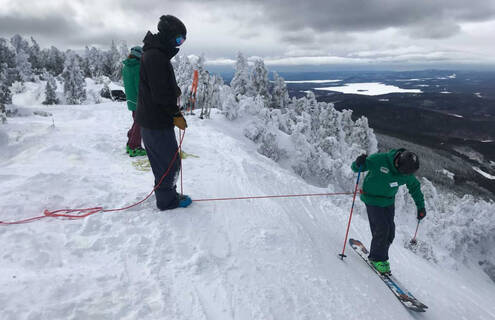
Dartmouth Hitchcock Medical Center’s Division of Wilderness and Austere Medicine is now the first institution on the East Coast to offer a Diploma in Mountain Medicine (DiMM)
The training for advanced medical professionals is offered in partnership with Acadia Mountain Guides (AMG) and merges medical expertise with mountain rescue techniques.
It is only the third accredited program for civilians in the country.
How this program differs
“There’s a focus on mountain medicine aspects, which has a lot to do with altitude, cold environments—potentially frostbite, hypothermia and things like that—and then you throw in the whole other aspect of mountain rescue,” says Nicholas Daniel, DO, who is the director of the Wilderness and Austere Medicine Fellowship at Dartmouth Hitchcock Medical Center (DHMC).
“A lot of the typical wilderness medicine courses will teach you how to manage patients, but this also has a huge emphasis on actual mountain rescue: making anchors, hauling people over cliffs or up cliffs with rope litters, skills on how to package patients up and transport them via helicopter, and a lot of those aspects,” he says. “This is a unique partnership with one of the most well-known guiding companies in the northeast."
Jon Tierney, an internationally licensed IFMGA mountain guide and founder of Acadia Mountain Guides, proposed the program believing it offers skills applicable locally and globally from expeditions to rural health settings.
Tierney, who holds qualifications as a nurse and flight paramedic, emphasizes the challenges of providing care in remote, rugged environments. “Our training connects the medical proficiency of DHMC with the rescue skills of AMG, enabling us to effectively assist patients in these demanding situations.”
Certification requirements
The DiMM requires more than 225 hours of hands-on instruction, including a Wilderness Advanced Life Support class and Level I Avalanche Training. The program is targeted at advanced medical providers and welcomes physicians, advanced practice providers, nurses, paramedics, and medical residents.
Daniel points out that many participants will already have some interest or experience in advanced wilderness life support.
“The winter course will take place in the White Mountains on Mount Washington, which is an excellent spot for that, and then the summer course will take place in Acadia National Park. So those are two excellent locations to do mountaineering and to visit, even outside of a program,” he says.
Program goals
Certification adheres to the rigorous standards set by prominent mountaineering and rescue organizations, including the International Mountaineering and Climbing Federation (UIAA), the International Commission for Alpine Rescue and the International Society for Mountain Medicine.
"DHMC aims to provide the highest level of care in the region, creating a seamless connection between field treatment and hospital services,” concludes Daniel. “The DiMM will enhance patient care from the moment of injury through hospital discharge.”
The application process is now open on a rolling basis for eligible healthcare providers.
This article first appeared in the November 2024 edition of Connections Magazine and has been modified for the web.